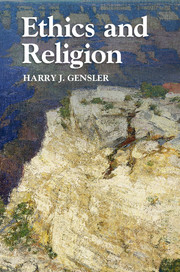3 - Modified DCT
from PART I - ETHICS AS GOD'S COMMANDS
Published online by Cambridge University Press: 05 May 2016
Summary
This chapter improves divine command theory by adding four words: a good action is good because a wise and loving Creator desires it. This modified DCT handles objections better.
Modified DCTs base an action's goodness or rightness on God's will in a qualified way. Recent religious philosophers have developed various modified DCTs. To make the issue more manageable, I'll break the problem of constructing a viable DCT into various subproblems. My goal here is to construct the strongest possible modified DCT.
This chapter rejects strong moral realism: it assumes that there are no moral facts about the value of actions (including oughtness, permissibility, and goodness) that hold independently of actual or hypothetical facts about will (desires, commands, approvals, and so on), including divine and human will. Chapters 4–6, about natural law, assume the opposite.
Qualifications
Suppose there's a personal Creator of the world; what qualifications does it need to author the moral order? Consider two cases:
• Creator is Ares, like the ancient Greek god of war, but worse. Ares is hateful and loves cruelty. He commands that we hate each other and cause others maximal pain.
• Creator is Yahweh, like the God of Christianity. Yahweh is wise and loving. He commands that we love each other and treat others as we want to be treated.
If the hateful Ares created the world, we'd have no duty to follow his commands; he's unfit to author the moral law. But the wise and loving Yahweh is fit to author the moral law. I suggest that Creator, to author the moral law, needs to be like Yahweh: wise and loving. So I propose this modified DCT:
A good action is good because
a wise and loving Creator desires it.
Love isn't enough, since it could be ignorant. Wisdom isn't enough either, unless it includes love. “Wise and loving” may be enough. Now some atheists may object that our world, with all its suffering, couldn't have come from a wise and loving Creator; we'll deal with this problem in Chapter 8.
Divine Wisdom
I suggest that the Creator, to author the moral law, has to be wise and loving. But what, more precisely, does “wise” here mean? I'll sketch three possible answers.
(1) William Frankena (1973a: 110–14) discusses general moral rationality.
- Type
- Chapter
- Information
- Ethics and Religion , pp. 29 - 54Publisher: Cambridge University PressPrint publication year: 2016

